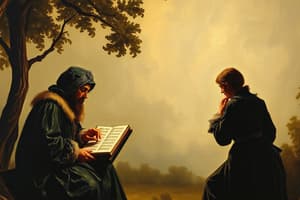Podcast
Questions and Answers
What is the main difference between an opera and an oratorio?
What is the main difference between an opera and an oratorio?
- Oratorios are composed for the chorus, vocal soloists, and orchestra while operas are not
- Oratorios are performed in concert halls and places of worship while operas are not
- Oratorios have no acting, scenery, or costumes while operas do (correct)
- Oratorios are based on biblical stories while operas are not
What was Handel's most famous English oratorio?
What was Handel's most famous English oratorio?
- Judas Maccabaeus
- Messiah (correct)
- The Creation
- Israel in Egypt
What is the unique feature of Handel's oratorio Israel in Egypt?
What is the unique feature of Handel's oratorio Israel in Egypt?
- It is not based on characters or a plot (correct)
- It is based on a poetic adaptation of biblical accounts
- It is a tripartite form
- It is scored primarily for the chorus
What was Bach's primary output of vocal music?
What was Bach's primary output of vocal music?
Which of the following was NOT a major contribution of Johann Sebastian Bach?
Which of the following was NOT a major contribution of Johann Sebastian Bach?
What was the significance of the introduction of the cantata form by Lutheran theologian and poet Erdmann Neumeister?
What was the significance of the introduction of the cantata form by Lutheran theologian and poet Erdmann Neumeister?
What is the main theme in a fugue called?
What is the main theme in a fugue called?
Which musical element refers to the lowest voice in a polyphonic composition?
Which musical element refers to the lowest voice in a polyphonic composition?
What musical technique is used when a second voice presents the subject in a fugue?
What musical technique is used when a second voice presents the subject in a fugue?
What is the defining characteristic of country music according to the passage?
What is the defining characteristic of country music according to the passage?
What is the defining characteristic of opera according to the passage?
What is the defining characteristic of opera according to the passage?
Study Notes
Opera and Oratorio
- Opera: a drama with music, where music is essential to the storytelling
- Oratorio: a large-scale composition for chorus, vocal soloists, and orchestra, with no acting, scenery, or costumes
- Most oratorios are based on biblical stories, but not usually performed in religious services
Handel
- 1618-1759, born in Halle, Germany
- Master of Italian opera and English oratorio
- Started studying music at age 9, despite his father wanting him to study law
- Became England's most important composer and favorite of Queen Anne
- Famous works include "Messiah" and "Israel in Egypt"
Handel's Messiah
- Composed in 24 days, premiered in Dublin
- Unique in that it has no plot, based on the New Testament
- Initially not well-received in London due to using religious text in a theater
Israel in Egypt
- Begun October 1, 1738, unique in that it's not based on characters or plot, with a libretto directly from the Bible
- Scored mostly for chorus, with direct Bible quotations, not well-received initially due to public theater performance
J.S. Bach
- 1685-1750, one of the greatest composers of all time
- Virtuoso organist, keyboardist, violinist, and prolific composer
- Came from a large family of musicians, studied with his older brother
- Composed in every major Baroque genre except opera, blending and developing them further
- Vocal output primarily written for the Lutheran church, often based on familiar hymns
- Famous works include "Art of Fugue" and "Well-Tempered Clavier"
Cantata
- Introduced by Lutheran theologian and poet Erdmann Neumeister, a sacred work for musical setting
- Contains soloists, instruments, choruses, poetic and biblical texts, a musical sermon based on Gospel and Epistle readings
Fugue
- Polyphonic composition based on one main theme, called a subject
- Each melodic line is a voice, whether vocal or instrumental, modeling a vocal concept with Soprano-highest voice and bass-lowest voice
- Elements include answer, countersubject, episodes, stretto, pedal point, inversion, retrograde, augmentation, and diminution
Studying That Suits You
Use AI to generate personalized quizzes and flashcards to suit your learning preferences.
Description
This quiz covers the elements of fugue composition such as subject, voice, answer, countersubject, episodes, and musical techniques like stretto and inversion. It also includes information about the diverse styles found in country music, from traditional fiddlers to modern pop artists.




